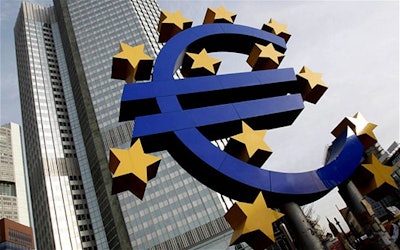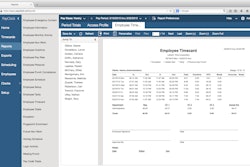
LONDON (AP) — The eurozone's hopes for a strong economic recovery this year have soured over the past couple months, partly because of the crisis over Greece's future in the currency zone and fading growth in China.
So there's growing speculation that official figures released Friday will show the 19-country bloc's growth rate eased during the second quarter.
With most elements of economic activity — such as industrial production, retail sales and construction — already shown to have had a subdued quarter, economists think the quarterly growth rate was unchanged at 0.4 percent. Many note, however, that the figure could disappoint and come in as low as 0.2 percent.
"Recent European data have tended to underwhelm, suggesting that the euro area has struggled to build upon the momentum gained earlier in the year," said James Nixon, chief European economist at Oxford Economics. "The recovery is therefore delicately placed."
The stalling in growth would be disappointing for the eurozone, where there was much optimism in early spring that the region was set for a strong pick-up.
With oil prices sharply lower, the euro at multiyear lows and the European Central Bank on a 1.1 trillion-euro ($1.3 trillion) bond-buying spree to keep market interest rates low, there were hopes that the eurozone had turned a corner after years of crisis. In the first quarter of 2015, the eurozone's big four economies — Germany, France, Italy and Spain — were all growing at the same time for the first time since 2010.
Since then, the eurozone has seen the Greek debt crisis explode again and suffered from growing uncertainty over the Chinese economy.
Though Greece may only account for around 2 percent of the eurozone's annual GDP, it has proved a headache for its partners in the region. As the prospect of a Greek exit from the euro grew in June and July, tensions grew, hurting confidence among investors and consumers.
By contrast, China is not a minnow — it is the world's second-largest economy — and its economic slowdown and market volatility in the last few months are having a negative impact around the world. Just like the United States, if China sneezes, the world catches a cold.
Still, the eurozone economy is expected to push ahead in the second half of the year, now that the worst of the crisis over Greece's future is over.
"We are fairly confident about the recovery continuing despite the potential headwinds," said Mark Wall, chief economist at Deutsche Bank. He noted the biggest dangers to the eurozone were uncertainty over Greece, the economic slowdown in emerging markets and China, and possible interest rate hikes by the U.S. Federal Reserve.
The factors that helped promote the recovery in the early months of the year are largely still in place for most of the eurozone. Greece is the exception, as it is expected to slump back into recession under the strain of cash withdrawal limits and budget cuts demanded by creditors in return for a new bailout.
The euro has steadied but remains at relatively low levels against the dollar, at around $1.11, as the ECB continues to pump about 60 billion euros into the financial system every month. That should keep helping exporters, particularly in Germany.
Perhaps more importantly for the average European household, oil prices are falling again. Money saved at the pump is money that can be used elsewhere. If inflation remains at super-low levels as a result, then wages may continue to outstrip price rises, which should help consumption.
Still, Oxford Economics' Nixon says the eurozone needs more help if it is to grow more strongly, and highlights the importance of a long-needed pick-up in investment. With many eurozone governments still focusing on reducing debt, that would need to come from companies, which could spend more on projects if their earnings pick up, he noted.






















